Sudan’s deep state still poses a threat to the democratic process and fixing the security question remains a priority for the transition to work, observers suggest.
The transitional government needs to recognise the fact that, for decades, the Sudanese Islamic Movement followed by the National Congress Party embedded themselves within every institution throughout the country, including the security structures. This extended to civil society and businesses, including the commercial and banking sectors as well as the legislative system that governs Sudan.
 To ensure the success of the transition process the transitional government needs to deal carefully with the fractured military, security and intelligence apparatus and isolated Islamists. Unless these forces are unified under one leadership, they could try and mobilise disenfranchised Islamist conservatives and isolated security personnel.
To ensure the success of the transition process the transitional government needs to deal carefully with the fractured military, security and intelligence apparatus and isolated Islamists. Unless these forces are unified under one leadership, they could try and mobilise disenfranchised Islamist conservatives and isolated security personnel.
The head of Sudan ‘s ruling transitional council, Gen. Abdel-Fattah Burhan, announced Wednesday that “life has returned to normal,” following a tense stand-off between the armed forces and rogue intelligence officers who had fired shots in the air to demand better severance benefits, The AP reports (above):
Speaking in a press conference on Wednesday, Burhan said the armed forces will “not allow any coup to occur,” adding that it’s a “shame that weapons were raised in the faces of the people.” Sudanese Prime Minister Abdallah Hamdok described the mutiny as “discord” aimed at “cutting off the nation’s transition to building a solid democracy.” …. Clashes killed two people and injured four others, including two officers, he added. The mutiny was the latest twist in Sudan’s fragile democratic transition after three decades of authoritarian rule under former President Omar al-Bashir. A sweeping protest movement ousted al-Bashir and led to the creation of a joint military-civilian government last summer.







